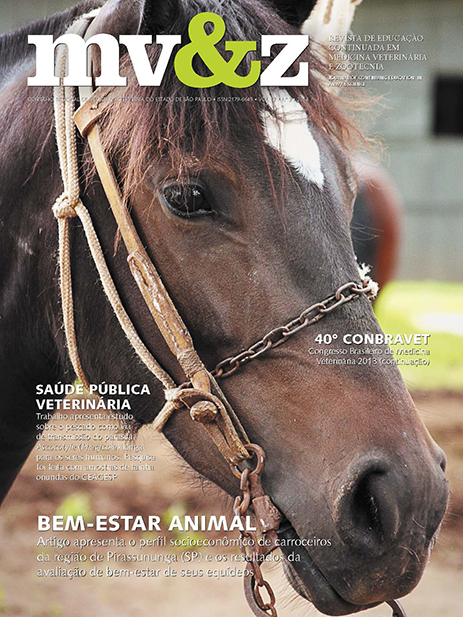Perfil dos carroceiros, avaliação clínica e do bem-estar dos seus cavalos de tração da região de Pirassununga-SP
Conteúdo do artigo principal
Resumo
Foi aplicado um questionário destinado a levantar as condições socioeconômicas dos carroceiros da região de Pirassununga-SP e analisar as condições de bem-estar a que são submetidos os seus equídeos de tração. As entrevistas foram efetuadas, no período de agosto de 2012 a julho de 2013, durante o acompanhamento do “Projeto Carroceiro” promovido pela Faculdade de Zootecnia e Engenharia de Alimentos (FZEA/USP); e de visitas realizadas às residências dos carroceiros inscritos no projeto, tendo-se obtido uma amostra de 26 indivíduos que trabalhavam como carroceiros. Posteriormente, também, foram analisados os prontuários de 49 cavalos atendidos anteriormente, de outubro de 2011 a junho de 2012, início do projeto, para a avaliação das alterações clínicas registradas. A maioria dos carroceiros começou a trabalhar antes de atingir a maioridade; complementava a renda com outras atividades; sustentava quatro ou mais pessoas com a renda obtida; transportava materiais variados de descarte e os depositava em pátios destinados a este fim ou aterros sanitários. Todos recebiam menos de R$ 1.000,00 ao mês, gastando entre 10 e 30% da renda com o animal. Grande parte (8/26) mantinha seus animais presos aos arreios durante os intervalos, mas não utilizava chicote (16/26). As principais alterações clínicas foram problemas locomotores e cutâneos. A alimentação adotada era de baixa qualidade.
Detalhes do artigo
Seção
1. Autores mantém os direitos autorais e concedem à revista o direito de primeira publicação, com o trabalho licenciado sob a Creative Commons Atribuição-NãoComercial-SemDerivações 4.0 Internacional
2. Autores têm autorização para assumir contratos adicionais separadamente, para distribuição não-exclusica da versão do trabalho publicada nesta revista (ex.: publicar em repositório institucional ou como capítulo de livro), com reconhecimento de autoria e publicação inicial nesta revista.
3. Autores têm permissão e são estimulados a publicar e distribuir seu trabalho online (ex.: em repositórios instituicionais ou na sua página pessoal) a qualquer ponto antes ou durante o processo editorial, já que isso pode gerar alterações produtivas, bem como aumentar o impacto e a citação do trabalho publicado (Veja O Efeito do Acesso Livre);
